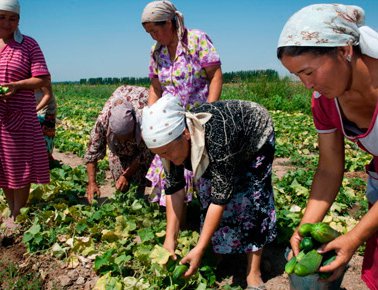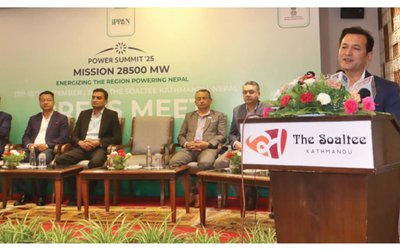
According to the famous development economist Albert Hirschman, agribusiness works to create at least a backward and forward link in all industrial or construction sectors. However, a closer look at the situation in developing countries reveals that agribusiness in developing countries directly affects more people than any other public service facility, such as energy, communications, or transportation
According to the Central Statistics Office, economic growth is estimated to be 2.28 percent in the fiscal year 2076/77. The growth of the agriculture sector is estimated at 2.59 percent, industry at 3.23 percent, and service sector at 1.99 percent. 14.27 percent and 58.08 percent respectively.
There are many powerful social and economic reasons to invest in agriculture in Nepal. In favor of poverty alleviation, agricultural income is lower than in other economies, so it helps the largest and poorest sections of society to generate sustainable growth in agricultural income. It helps to limit the rural-urban population and it helps to prevent social problems in cities and towns.
Agribusiness has been playing an important role in Nepal's overall economy. More than two million families, thousands of private enterprises, including merchants, millers, agents, processors, farmer groups and cooperatives, and some parastatal organizations are involved in such business. Similarly, the private sector continues to play a major role in the total agricultural production trade. A look at Nepal's agricultural landscape shows that agricultural production was 26 percent of GDP.
Against this background, understanding the small farmers and looking at agribusiness and agro-industry about small farmers will not bring any change in the economic condition of small farmers. We need to change the traditional approach to small farmers and change the development approach towards them accordingly.
The new concept and approach call for a dynamic relationship between small farmers and agribusiness based on agribusiness and market economic reward determination. Reflecting agribusiness and agro-industry in rural areas will not be of any benefit to any party. What is needed is a reorganization of all three partners, shifting the market mechanism in and out of the "rural trend".
There is a "risk" element in this direction and such risk can be mitigated by favorable government policies for efficient operation of all parties. Traditional government intervention and its direct involvement should be removed and handed over to the private sector, otherwise it may be hostile to take the proposed new direction in the wrong direction to uplift the economic condition of these small farmers.
Although the private sector has been playing a major role in the trade of agricultural products, there are still some public sector corporations involved in trading one or more products such as food, milk and milk products, oilseeds, coffee, tea. These are Salt Trading Corporation (STC), Food Management and Trading Company Limited, and Dairy Development Corporation (DDC I).
Many governmental and non-governmental organizations exist to support agricultural product marketing/trading activities. The most important institution for building infrastructure and market information services in the Department of Agriculture, Market Services Department. Other institutions are directly the Central Food Research Laboratory and the Bureau of Standards and Metrology and the local metropolis/municipality.
Their role is in some cases as service providers and in other cases as law enforcement agencies for food law/weight and measurement and hygiene.Similarly, the Federation of Nepalese Chambers of Commerce and Industry (FNCCI) also has a private-sector technical branch. The Agro Enterprise Center (AEC) has been instrumental in facilitating private agribusiness in particular.
AEC is very active in the trade/market promotion of many high-value agricultural products such as flowers, vegetable seeds, silk, fruits and vegetables, angora wool, tea, cardamom, coffee, and dairy products. The organization has also been very active in advocating with the government for necessary policies and regulatory reforms to attract the private sector to agribusiness. By AEC
The AEC has also organized trade fairs in Nepal and promoted Nepali agricultural products in India through agricultural fairs. One District One Commodity etc. programs have been completed. The agricultural development strategy has also properly recognized the role of the private sector but it needs to be used successfully
Marketing costs
It would not be an exaggeration to say that the marketing costs are higher in the absolute period because of the difficult geographical location and the fact that there is still a complete disregard for harvesting and post-harvest reforms.
The importance of these activities in value addition in production has not been properly recognized by the government and as a result, nothing has been done in this regard to improve the situation.
Like other Asian nations, Nepal has a large and growing young population with dynamism and growth rates. Due to the strong desire to get a good education and the desire to experience life in a foreign country, the number of young Nepalis, especially workers and students, has increased in the last few years.
Agriculture is the area most affected by the influx of young Nepalis. Agriculture is the primary livelihood activity for most of the population of the country. And it is a practice that is deeply rooted in our traditions, life, literature, religion, knowledge, and philosophy. Sudden depletion or change of human resources in this sector can dramatically affect all aspects of social life and the national economy.
Agriculture is a rural phenomenon, and statistics show that most of the rural working-age population leaves the country in search of employment and income abroad. This creates a vacancy for agricultural labor which greatly affects productivity. It’s easy to buy a sack of rice at a corner store, but we don’t realize how many people have worked so hard to bring our sacks of rice. No sector can deliver the expected level of return to the national economy unless the youth of that country are involved.
Nepal's agricultural sector is currently suffering from a shortage of human resources and agri-entrepreneurship as cash attraction is driving young and energetic minds from the country to the Gulf and other countries. Selling land and livestock to raise money for employment in rural areas is a growing trend in rural areas. But because of Luke's temptation, much young Nepalese living abroad have at times fallen victim to injustice, insecurity, terrorism, accidents, and serious health problems.
The working-age population was shifting to outsourcing and most of them were from rural areas.The reasons for moving to Nepal are the same as in other parts of the world. Poverty, limited employment opportunities, deteriorating agricultural productivity, and political instability are some of the objectives. There are many villages in Nepal where labor migration has been established as a community culture. The influence of friends, relatives, and well-wishers also plays an important role in promoting international labor migration.
Migration is seen not only as a way to escape poverty but also as a means to improve one's living standards. By paying proper attention to high-value products and their commercialization, agriculture will make the country more economically independent.
More and more young people need to be motivated to start investing in energy and entrepreneurial agriculture to make the country prosperous. The Nepali government can do this by providing the right motivation and opportunities to the youth so that people can feel more honored by working in their motherland.
More and more young people will ignore the idea of going for foreign employment and join this business if they can get a more attractive return. Increasing agricultural production is important to achieve food security, self-reliance, and import substitution, which is only possible through the country's youth. It is the responsibility of the government and the private sector to attract the youth who return to Nepal after COVID 19 and stay in Nepal in skills training and agriculture.
Agriculture experts said that Nepal had the opportunity to cut record crops due to timely monsoon and abundant agricultural labor, but the government landed due to a weak supply mechanism.
The Covid 19 epidemic disrupted global production and supply chains, leading to a shortage of the world's most widely used phosphorus fertilizer, diammonium phosphate (DAP).
Due to this, there was a shortage of urea during the first and second top dressings. In response, the Agriculture and Livestock Development Minister pledged to import urea from Bangladesh and requested 5,00,000tonnes. But the government could not import it.
- Susan's “U-Turn” From Atheism To Spirituality And Superstition: Some Considerations
- Jun 29, 2025
- Former Ambassador To People’s Republic Of China Acharya's 'Diplomatic Diary': A Collection Of "Autobiography " Including Diplomacy
- Jun 17, 2025
- Banker And Businessman Being The Same Person: How Practical, How Impractical
- Jun 01, 2025
- 2082/83 Policy And Program: Presentation New, Short But Not Exciting
- May 07, 2025
- Nepal's Capital Market: Some Analysis
- May 02, 2025
















